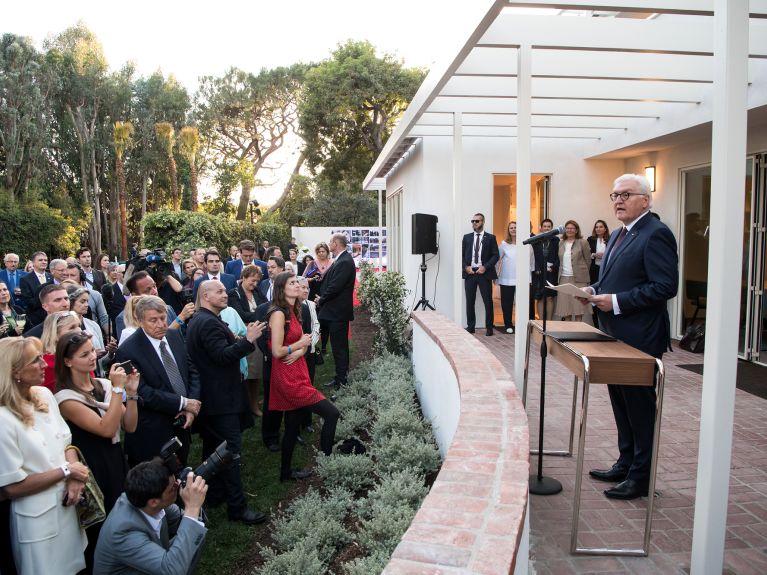Four for the transatlantic exchange
These are the first scholarship holders to move into the Thomas Mann House in Los Angeles.

Conceived as a place of intensive exchange: Thomas Mann House in Los Angeles. The author and Nobel laureate was the most important voice of German intellectuals in exile during the days of the Third Reich. Together with his family he lived in California from 1942 onwards, where he encountered a community of German artists and thinkers. In 2016, the German government acquired the house he built there and in which he worked for ten years. Intellectuals, artists, scientists and publicists are now able to stay there for up to ten months at a time on a government scholarship.
The Thomas Mann House Fellows are pioneers addressing questions of present-day life.
“Just as Thomas Mann engaged with the big issues of his time, the first four Fellows are pioneers addressing questions of present-day life,” commented Annette Rupp, Director of Artist Residency at Villa Aurora. Rupp now also oversees the Thomas Mann House, which is just ten minutes by foot from Villa Aurora, as well as the scholarship programme. “The idea is for the Fellows to use our comprehensive network, to lead workshops, give lectures and enter into contact and debate with American intellectuals and civil society.”
The first Thomas Mann Fellows are set to move in mid-2018. And this is who they are:
Jutta Allmendinger
The German sociologist is President of WZB Berlin Social Science Centre and Professor of Educational Sociology and Labour Market Research at the Humboldt University of Berlin. Her scholarly interest lies in the societies of today and tomorrow – in particular biographies and how they are shaped for example by educational institutions and the labour market. Her book “Das Land, in dem wir leben wollen” was published in 2017. It considers the question of how Germans imagine the future.
Heinrich Detering
The literary scholar, translator, lyricist and literature critic is a professor at Georg-August-Universität Göttingen and was President of Deutsche Akademie für Sprache und Dichtung from 2011 through to 2017. The oeuvre of Thomas Mann ranks among his topics of research – in Göttingen he runs the Thomas Mann working party, and he is also the publisher of the annotated Frankfurt edition of the writer’s works, letters and diaries. Furthermore, Detering is an expert on all things American and has immersed himself in Bob Dylan's lyrics and life – in 2016 he published a biography on the musician.
Burghart Klaussner
The actor was awarded the German Film Critics Association’s Preis der deutschen Filmkritik for his performance in “The White Ribbon”, directed by Michael Haneke. Klaussner is one of the towering intellectuals of the German acting world. He is a member of Freie Akademie der Künste in Hamburg e.V., he is on the board of Deutsche Filmakademie e.V., he directs, sings and has lent his voice to innumerable audio books and radio play productions.
Yiannos Manoli
Yiannos Manoli has been Fritz Hüttinger Professor for Microelectronics at the University of Freiburg since 2001. Yet the Cyprus-born scientist’s career began in the US – as a Fulbright scholar in the subjects of physics and maths at Lawrence University, Wisconsin. He obtained his Master’s at the University of California, Berkeley and his doctorate in Duisburg. Among other things, Manoli looks at the question of how science, technology and industry are set to develop in the future and what their influence on social life may look like.
